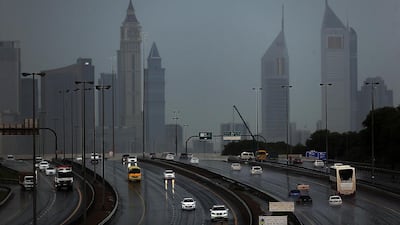DUBAI // Last year, the Middle East experienced the driest two months since records began, a study by a Dubai agriculture centre shows.
Research conducted by the International Centre for Biosaline Agriculture (ICBA) found that rainfall in January and February dropped from 180 millimetres in 2013 to only 20mm the following year, possibly as a result of climate change and human-induced greenhouse gas emissions – the lowest recorded since 1950.
“That winter was really exceptional,” said Karim Bergaoui, climate and water modelling scientist at ICBA. “It was the lowest yet recorded.”
The monthly data was registered by more than 200 stations scattered across Jordan, Palestine, Lebanon and Israel. “They experienced the most severe drought ever,” he said.
“The average is about 150mm. Sometimes it can go up to 400mm but that year, we registered 20mm, which is nothing. Some wells dropped by 20 metres.”
Tests were conducted around the world, in collaboration with the University of Oxford, covering all uncertainties in climate and the environment.
“We found that 45 per cent of the severity of the event was due to climate change from human-induced greenhouse gas emissions around the world,” Mr Bergaoui said. “The rest was from natural changes, but if we project it to 20 years, it will be worse. Such events will be 30 per cent more frequent than if we didn’t have greenhouse gases.
“The UAE is not an agricultural country, but food prices will be affected because food comes from that region,” he said.
And with at least 85 per cent of the UAE’s food imported, the impact could be high. “Farming in the GCC is a very expensive luxury hobby,” said Jeffrey Culpepper, chairman of Agrisecura in Dubai. “The only solution to making a dent in the food security issue of the GCC is high-tech, low-water-use greenhouses.”
He said the effects of climate change would get more extreme in distorting weather patterns.
“What’s happening in the Levant is not a one-off event, but the new normal,” he said. “No longer can farmers operate on large-scale grain production depending on seasonal rainfall.
“If farmers do not have access to reliable water sources for irrigation, farming as they know it is coming to an end.”
Nicholas Lodge, managing partner at Abu Dhabi agricultural consultancy Clarity, said the region was severely water-stressed due to extraction and excessive use of groundwater supplies.
“This year, we are experiencing a strong El Nino weather system, [when warmer than average water in the eastern equatorial Pacific affects global weather], which may explain the particularly marked decline,” he said. “With low rainfall at the best of times, high summer temperatures and depleted groundwater, the region suffers from very poor agricultural fundamentals. ”
Others blamed it on the lack of education. “It’s a pity that for money and the oil industry, we have put the environment on the back bench,” said Dr Jean-Yves Mevel, aquaculture professor at UAE University.
He said people needed to be aware of their effect on the environment.
“In the UAE, expatriates pay three times the price of water to cut consumption but Emiratis don’t,” he said.
cmalek@thenational.ae

